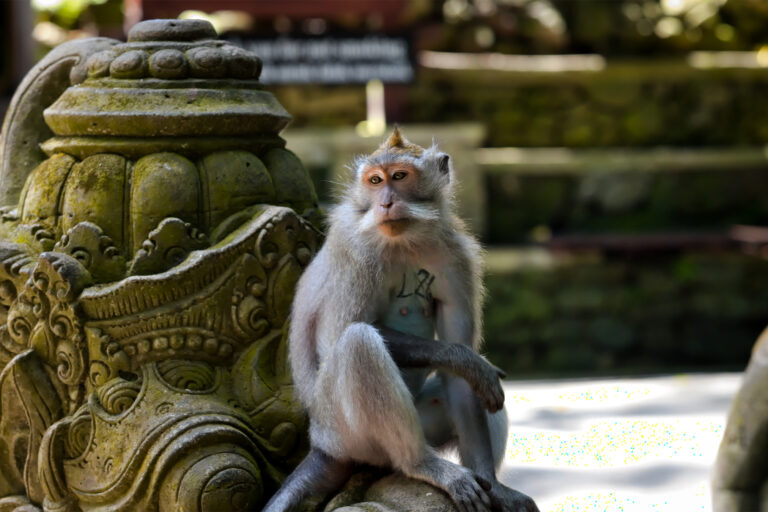- Indonesia’s Bali, with its beautiful beaches and ancient temples, is a tourist hotspot where many businesses cater to foreign travelers, including those that sell art and curios.
- A new study finds that primate skulls, including those from threatened species such as orangutans, gibbons and proboscis monkeys, are openly sold in these shops, despite the trade being illegal.
- Between 2013 and 2024, researchers recorded more than 750 carved and uncarved primate skulls sold to mainly foreign tourists, with sales increasing over time.
- Conservationists say this illegal, barely monitored international trade poses an additional threat to already threatened primates in Indonesia, and call for stricter law enforcement and monitoring to shut down the trade.
Charmed by the picturesque beaches and enchanting temple complexes, millions of tourists flock each year to the tiny Indonesian island of Bali to experience its unique culture and art. When they leave, many take home a piece of Bali in the form of souvenirs, such as carvings, pottery or textiles. Unbeknown to them, some may even be committing a crime if they pick up primate skulls — a commodity openly sold in Bali’s curio shops, despite it being illegal.
A recent study, published in the journal Primate Conservation, throws the spotlight on the primate skull trade in Bali, where curio and art shops sell carved and uncarved primate skulls. It found that the skull trade is aimed primarily at foreign tourists looking for souvenirs, and includes those from protected and threatened species. This trade not only flouts national and international laws, but also poses a conservation threat to Indonesian primates, many of which are racing toward extinction.
“For me, what stands out [about the trade] is that it’s Bali,” says study co-author Vincent Nijman from the Oxford Wildlife Trade Research Group at Oxford Brookes University, U.K. He points to the culture of the predominantly Hindu island, where local primates hold a sacred status, are revered and worshipped, and are prominently portrayed in local literature, art and poetry. “To see that, on the one hand, playing out on a day-to-day basis in Bali, and then walking into a shop where you see dozens of primate skulls — that’s a bit of a contrast.”
Between 2013 and 2024, Nijman and co-author Jessica Chavez, also from Oxford Brookes, made more than 200 visits to 30 such curio shops in five towns in Bali (Kuta/Legian, Denpasar, Ubud, Tampaksiring and Sanur) and the Tirta Empul temple complex. Posing as foreign residents, they questioned traders, vendors and carvers about the species of primate skulls they sold, where they sourced them from, and who the typical buyers were.

During this 11-year-period, the researchers recorded 754 skulls belonging to at least 10 primate species. Most were from macaques — mostly long-tailed macaques (Macaca fascicularis) according to the vendors — and ebony langurs (Trachypithecus auratus) because they were the easiest to catch with nets and traps. A quarter of the skulls traded came from legally protected species, including critically endangered Bornean orangutans (Pongo pygmaeus), gibbons (genus Hylobates), and endangered proboscis monkeys (Nasalis larvatus).
Most skulls were said to be sourced from Borneo and Java, indicating that the trade networks span across the country. The prices of the skulls varied based on the species and the intricacy of the carvings. Uncarved macaque skulls sold for $25 a piece on average, and langur skulls for $38. Carved skulls of the same species, on the other hand, were $93 and $59, respectively. The highest price the researchers recorded was $156 for an uncarved orangutan skull.
The researchers also observed an increasing trend in the trade. While they recorded only 47 skulls in 2014, that number climbed to 227 skulls in recent years. However, these numbers are conservative estimates, and the actual trade may be much higher, they say.
“The study highlights that the primate skull trade, while niche, is a pervasive and organized market with clear supply chains,” says primatologist Andie Ang, deputy chair of the Primate Specialist Group at the IUCN, the global wildlife conservation authority, who wasn’t involved in the study. “The trade in primate skulls directly threatens Indonesia’s primate biodiversity … and the loss of even a small number of individuals can have significant impacts on already vulnerable populations.”

Buyer beware of illegal trade
In Indonesia, all primates except long-tailed macaques and southern pig-tailed macaques (Macaca nemestrina) are legally protected, which means it’s illegal to catch, transport, trade or possess these species, alive or dead. Violations are punishable by up to five years in jail and up to $6,250 in fines. In addition, the government hasn’t stipulated trading quotas for the two unprotected species, meaning there’s currently no legal way to hunt or trade them.
All the primate species that Nijman and Chavez encountered are listed under CITES, the international convention regulating wildlife trade, meaning international trade in the animals or their parts is either completely banned or requires special export permits from Indonesia’s CITES management authority.
“Indonesia has never given out CITES permits for the export of [primate] skulls,” Nijman says, “so that simply means that all the export is done illegally.”
Despite these regulations, the study finds that the illegal trade in primate skulls thrives in Bali, and vendors happily participate in it, telling their customers they can carefully pack the skull to conceal its identity or mislabel it for exports.
The illegal cross-border wildlife trade in Indonesia isn’t restricted to primate skulls. A 2024 study by the same authors found that more than 500 individuals of 20 CITES-listed species, including carved elephant, mammoth and walrus ivory and decorated nautilus and turtle shells, were sold in Bali and exported without permits.
“People always think that wildlife trade happens in dark alleys or under the table — not this trade,” Nijman says. “It is literally in glass cases, in shop windows, on shelves — it’s there for all to see.”
The study calls for strengthening enforcement of laws with increased inspections, seizures and prosecutions. It also recommends enhancing collaboration between conservation organizations, local governments and law enforcement agencies in sharing intelligence on trade networks and better monitoring of international trade of species regulated under CITES.
“It would be beneficial to all if simple, appropriate action is taken. And that simply means shutting down this trade,” Nijman says.

Educating tourists about the illegality of wildlife trade would also help to that end, the study says, adding that Indonesian authorities could engage with the tourism sector to increase awareness of the illegality of such wildlife trade.
“While tourism can bring economic benefits, it can also have unintended consequences for wildlife if the local market caters to exploitative souvenirs,” Ang says. For those tourists who want to do the right thing, she suggests familiarizing oneself with the wildlife protection laws of the country they’re visiting, as well as international regulations such as CITES. If one encounters any illegal sale of wildlife, she recommends reporting it to local authorities or organizations like TRAFFIC.
“Don’t buy wildlife — there’s no real need for it,” Nijman says.
And for tourists who want to take home memories of their Bali trip?
“Take a photograph,” he says.
Banner image: A long-tailed macaque in Bali, Indonesia. Macaque and langur skulls are the most sold because they are the easiest to catch. Image by Enrico Strocchi via Flickr (CC BY-SA 2.0).
CITES secretariat urges suspension of Cambodian long-tailed macaque trade
Citations:
Chavez, J., & Nijman, V. (2024). The open sale of primate skulls on Bali reveal complex Indonesia-wide wildlife trade networks. Primate Conservation, 38. Retrieved from http://www.primate-sg.org/storage/pdf/PC38_Chavez_Nijman_Bali_commerce_in_Primate_skulls.pdf
Chavez, J., Payuse, I. N., Kuntayuni, Campera, M., & Nijman, V. (2023). Tourism, international wildlife trade and the (in)effectiveness of CITES. Environmental Conservation, 51(1), 64-70. doi:10.1017/s0376892923000292
FEEDBACK: Use this form to send a message to the author of this post. If you want to post a public comment, you can do that at the bottom of the page.







